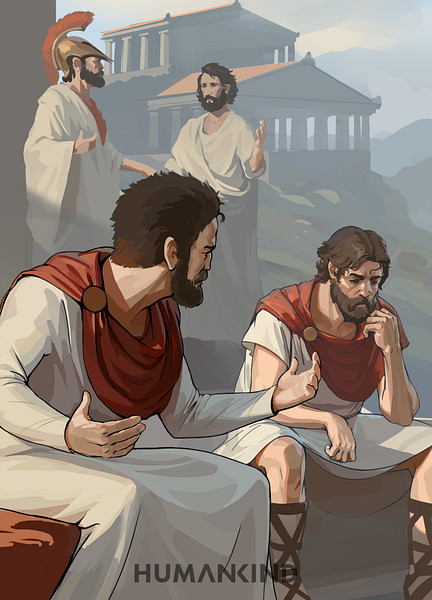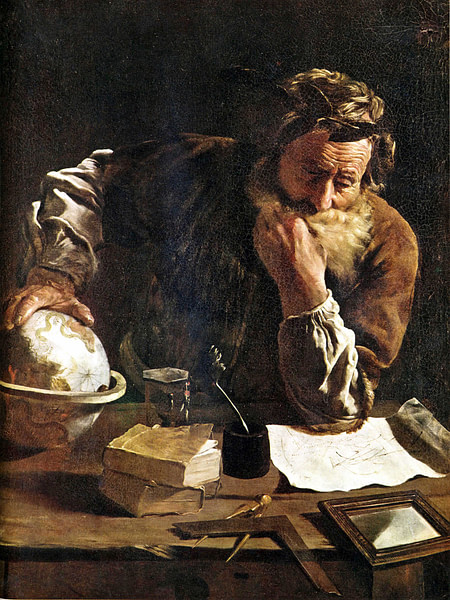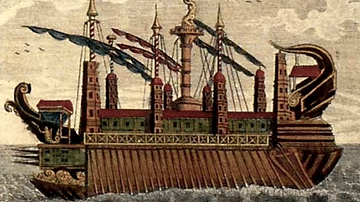
Ancient Greek Science is a modern term for the application of systematic inquiry into the individual, the world, and the universe, which began in Ionia in the 6th century BCE with Thales of Miletus (l. c. 585 BCE) and continued through the work of the astronomer Ptolemy (l. 100-170 CE) to form the foundation of modern scientific method.
Thales, and the other Pre-Socratic philosophers who came after him, were influenced by the works of the Babylonians and Egyptians but developed these earlier concepts to explain the world, and the individual's place in it, apart from the prevailing theistic vision of their time. Although many discussions of ancient Greek science begin with Hesiod (8th century BCE) and his calendar, he still held to the theistic explanation for how the world worked. Thales, while not denying the existence of the gods, explored the possibility that the world worked naturally on its own without them.
The goal of the early Pre-Socratic philosophers was to find the First Cause of existence, the basic stuff of the universe, from which everything else proceeded. From inquiries into the First Cause, the Pre-Socratics explored other aspects of the human condition including one's purpose in life, the existence of an afterlife, and the nature of reality. Although it cannot be said that any of the Pre-Socratics, or many of those thinkers who came after them, applied the scientific method to their inquiries or were 'scientists' in the modern understanding of that term, their efforts were a significant departure from how the Greeks understood themselves and their world, setting the stage for the development of scientific thought and method as those terms are understood today.
Thales & The First Cause
The Pre-Socratic philosophers (so-called because they predate the philosopher Socrates of Athens), beginning with Thales, made this departure on the understanding that the universe and world was knowable. One's mind could be used to study observable phenomena and form conclusions as to its cause, rather than accepting the explanation that all things existed and operated as they did according to the will of supernatural entities.
What is often referred to as a "scientific revolution" took place in Ionia (western Anatolia, modern-day Turkey) in the 6th century BCE, and, it is thought, most likely because the Ionians were not as firmly anchored in traditions of the past as others in mainland Greece. The port cities along the coast regularly welcomed ships from the Near East and Mediterranean, bringing with them new ideas and different ways of interpreting the world. Merchants from Mesopotamia, Egypt, and Phoenicia exchanged ideas as well as goods with the Ionians who also traveled themselves. Thales is understood to have studied in Babylon, where he would have been introduced to various Egyptian concepts and may have also traveled to Egypt himself.
Among these concepts would have been the understanding of the universe as eternal. In both Egyptian and Mesopotamian religion, the gods had always existed and so 'something' was already present for them to exist in. Thales asked what this 'something' was, what the underlying form of existence could be, and this question became the starting point for all others. Scholar Thomas Cahill comments:
What faced [the Pre-Socratic philosophers] every day, however, was not the eternal but the mutable – all the multiplicity, diversity, motion, and change they perceived in individual beings that go from nonexistence to birth and life and, finally, to death, decay, and nonexistence. Likewise, the earth beneath their feet and even the sky above their heads presented them with panoramas of constant change. It is not possible, they reasoned, to make sense of what is mutable, what is becoming, what passes so fleetingly into existence and then is gone forever. But because there is also in our experience a quality of permanence – individuals die but humanity remains, the crops return each year, the orchards bloom once more, the zodiac comes full circle – we do not live in an arbitrary universe but a patterned one. If this is so, there must be an underling thing that never changes, never has changed, and never will change, the uncreated material out of which all the mutable things spring. (146)
Thales claimed this First Cause was water. When water was cooled, it became ice (a solid), and when heated, vapor (air). Through its course in a channel, it moved other objects such as stones, or ships, or people, while also providing a home to fish and other aquatic life and sustaining human life as well. Based on these observations, Thales made his famous claim, and in their refutation of that claim, the Pre-Socratics who followed him began the process of what one would now call scientific inquiry.
Pre-Socratics as Scientists
Anaximander (l. c. 610 to c. 546 BCE), who may have been Thales' student, rejected his claim and replaced it with a creative force he called the apeiron – "the unlimited, boundless, infinite, or indefinite" (Baird, 10). This force had always existed, and, through it, all things were brought into being, were destroyed, and were reformed. No observable element could be the First Cause precisely because it was observable; water, itself, required a cause for its existence. Anaximenes (l. c. 546 BCE) rejected the apeiron as unprovable and claimed air as the First Cause, using essentially the same reasoning as Thales had for water.
These early Pre-Socratics set the pattern for those who followed in making empirical observations that led them to conclusions, but these conclusions never seem to have been tested. The works of the Pre-Socratics exist only in fragments and references by later writers so there is no way to know for certain whether any hypothesis was actually tested but, based on what is known of their process, it does not seem so. Regarding the claim that the Pre-Socratics were the "first scientists", scholar Robin Waterfield notes:
Scientific reasoning is a combination of forming testable hypotheses to account for observed phenomena…and of testing and re-testing these hypotheses by experimentation and logic. The resulting hypothesis should explain the observed phenomena in as simple a way as possible, should allow one to predict the behavior of related phenomena, and should cohere with the body of accepted scientific theories and doctrines. Throughout, everything should be quantifiable, measurable, and testable as far as is possible within the limitations of the technology currently available. There is absolutely no indication that the Pre-Socratics were scientists in this sense. There is little sign that they undertook experimentation at all…Of course, it is not entirely fair to criticize the Pre-Socratics for lack of experimentation; after all, a great deal of what interested them was not capable of empirical testing in their day; but that in itself helps to show that they should not be described as scientists in the modern sense of the word. (xvii-xviii)
While this is true, the Pre-Socratics did point the way toward the kind of process that would eventually become the scientific method, and so, as Waterfield also observes, they could be regarded as proto-scientists. Pythagoras (l. c. 571 to c. 497 BCE), after all, could not 'prove' the soul was immortal but made the attempt through his claim that mathematics was the underlying form of reality, and, as numbers have no end but repeat in different combinations, so too might the soul return repeatedly to earth through reincarnation. This is not a hypothesis that could be tested, but the claim at least rests on an observable phenomenon – numbers and their combinations – as opposed to the prevailing view of the Greeks that the gods, or other supernatural entities, were responsible for any given phenomena.
Xenophanes of Colophon (l. c. 570 to c. 478 BCE) rejected the anthropomorphic gods of the Greeks, claiming there was one God, unlike humans in any way, who created and sustained all things while Heraclitus of Ephesus (l. c. 500 BCE) dismissed the need for a First Cause entirely, claiming the nature of life was constant change – coming into being and passing away – and so change was life, not an aspect of existence, but existence itself. This claim was refuted by Parmenides (l. c. 485 BCE) and his student Zeno of Elea (l. c. 465 BCE), who advocated for the unity of existence. To them, change was an illusion and all one experienced was actually One and forever unchanging.
These claims inspired the other Pre-Socratics like Empedocles (l. c. 484-424 BCE), Anaxagoras (l. c. 500 to c. 428 BCE), Democritus (l. c. 460 to c. 370 BCE), and Leucippus (l. c. 5th century BCE), whose works formed the basis for the understanding of the atomic universe. Drawing on the claims of the others, Democritus was the first to advance the concept of tiny "un-cutables" known as atomos – atoms – that formed everything in the observable world.
Systematic Development & Definition
The works of the Pre-Socratics as a whole provided the foundation for Socrates who applied their method of inquiry, observation, and conclusion to human behavior and ethics. Rather than accepting what one was taught, Socrates said, one should question every claim to determine its truth and, further, whether one was living truly or only according to the script one had been taught to learn by others. Plato (l. 424/423-348/347 BCE) systematized the Socratic Method (or invented it) through his dialogues depicting various characters in conversation with Socrates through which a reader is forced to confront questions on the nature of life and one's response to it. Plato's work is so comprehensive in scope it touches on disciplines as varied as the modern concepts of science, philosophy, literary criticism, political science, religion, and law, to name only a few.
The systematic exploration of a subject was applied to the medical arts by Hippocrates (l. c. 460 to c. 370 BCE), the Father of Modern Medicine, who arrived at his conclusions through observation and experimentation. Plato's student Aristotle (l. 384-322 BCE) applied this same technique to, literally, every subject then known to humanity. His student, Theophrastus (l. c. 371 to c. 287 BCE), continued his work in subjects ranging from physics to biology, and his Enquiry into Plants and On the Causes of Plants earned him the epithet Father of Botany.
Although Aristotle and Theophrastus are often cited as early scientists, they, like the Pre-Socratics, also fail to live up to the modern definition as characterized by the seven steps of the scientific method:
- Question
- Research
- Hypothesis
- Experiment
- Analysis
- Conclusion
- Communication of Results
They, like their predecessors, moved more or less directly from hypothesis to conclusion and, in many instances where they did engage in experimentation, their conclusions were incorrect. Even so, their work continued to build a body of information others could draw upon in forming their own claims and conclusions. Even when Aristotle is wrong, he is at least engaging with the subject matter himself instead of accepting the conclusions of others.
Hellenistic & Roman Eras
Aristotle was the tutor of Alexander the Great, who encouraged the same method of inquiry he had learned from his teacher in his youth. Alexander brought scholars in various disciplines with him on his conquest of Persia, and their works then influenced others. After Alexander's death, his general Ptolemy I Soter (r. 323-282 BCE) established the Library of Alexandria in Egypt, which was built under Ptolemy II Philadelphus (r. 282-246 BCE) and attracted some of the greatest minds of the time. Among the head librarians was Eratosthenes (l. c. 276-195 BCE), the first to calculate the circumference of the earth and map the known world. Callimachus of Cyrene (l. c. 310 to c. 240 BCE) applied systematic classification to the corpus of Greek literature and created the first 'card catalog' for locating a specific work in a library. The great engineer and inventor Archimedes of Syracuse (l. 287-212 BCE) studied there, and, later, the engineer Hero of Alexandria (l.c. 60 CE) taught there.
Eratosthenes, Archimedes, and Hero (also given as Heron) would be considered 'scientists' in the modern sense of that term as they engaged in all seven steps of the scientific method, perhaps sometimes unevenly, to arrive at their conclusions and produce their inventions. Among the many creations of Hero is a commonplace device often taken for granted in the modern era: the vending machine. Archimedes' Screw, a cylinder enclosing a twisted blade, is still used today and he is recognized as the Father of Mathematics and Mathematical Physics.
Other thinkers of the Hellenistic Age include the astronomer Aristarchus of Samos (l. c. 310 to c. 230 BCE), who first proposed a heliocentric model of the universe, possibly based on the work of the Pythagorean philosopher Philolaus of Croton (l. c. 470 to c. 385 BCE). Hipparchus of Nicea (l. c. 190 to c. 120 BCE) rejected Aristarchus' claim primarily because it contradicted the standard model established by Aristotle, but, still, Hipparchus' impressive contributions include the invention (or development) of trigonometry, the discovery of the precession of the equinoxes, and he may have invented the famous Antikythera Mechanism, the world's first analog computer.
Pliny the Elder (l. 23-79 CE) applied scientific classification to every aspect of observable phenomena in his Natural History, and the physician Galen (l. 129-216 CE) did the same with the medical arts, as did the writer Vegetius (l. late 4th/early 5th century CE) with veterinary medicine.
Conclusion
Even though a significant number of these thinkers and writers might not fit the modern definition of 'scientist', they were all engaged in the same pursuit as any using the scientific method today: ascertaining and defining truth. In discussing the Pre-Socratics, Waterfield gives five 'scientific attitudes' one would need to hold to be considered a 'scientist'. The list reads, in part:
- The optimistic assumption that the world and its components are comprehensible.
- The assumption that the human rational mind is the correct tool for understanding the world.
- Adherence to a particular set of approaches to problem-solving.
- Tempered curiosity: although curiosity about the world is essential for the scientist, it must not be allowed to lead the investigator into hasty hypotheses or extravagant leaps of the imagination.
- A love of and facility with abstract concepts. (xix)
As Waterfield observes, the Pre-Socratics exhibit some or all of the above, and those who came after them even more so. The works of ancient Greek experimenters, observers, thinkers, and writers – those often referred to today as 'scientists' or 'proto-scientists' – changed the way the people of their time saw the world and established a way for those in the future to understand their own. The Almagest of the astronomer Claudius Ptolemy, the most influential astronomical work until the Early Modern Era, provided the foundation for On the Revolution of the Celestial Spheres by Nicolaus Copernicus (l. 1473-1543), inspiring the Scientific Revolution, which has shaped and continues to daily inform the modern world.









